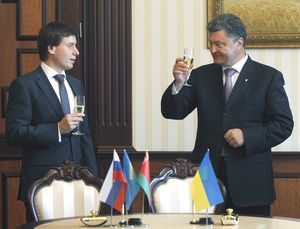Getting sucked down in the Customs Union
Ukraine signs a memorandum on the intensification of commercial cooperation with that purely political entity, resuscitated early this year
The one-day-long visit of the Eurasian Economic Commission (EEC) to Ukraine culminated in a signing of a memorandum on cooperation. On August 27 Ukraine’s Minister of Economic Development and Commerce Petro Poroshenko and the Minister of Commerce for the Eurasian Economic Commission Andrei Slepnev signed respective agreements on the intensification of commercial cooperation between Ukraine and the member states of the Common Economic Space (CES). The memorandum aspires to “consolidate the cooperation between the member states of the Customs Union, the Common Economic Space, and Ukraine, increase its efficiency, analyze the problems in bilateral commerce and search for mutually acceptable solutions.”
“The ratification of the FTA [free trade area with the CIS. – Ed.] allowed us to implement, in a very short span of time, those agreements which are conducive to Ukraine’s and Russia’s manufacturers access to their mutual markets. Today, our agreements open the access of [Ukraine’s] pipes to Russia’s markets; last week a decision on stainless steel pipes was passed,” said Poroshenko as he gave comments on the signing of the agreements.
Curiously, a closer study of the signed text reveals that Ukraine is not entitled to any tools in commercial relations with the CIS states in general, and with Russia in particular. The document is of purely declarative nature, “peace, freedom, blah blah blah.” The memorandum only reflects the intentions to elaborate in greater detail and concord all the questions of Ukraine’s bilateral trade with the Customs Union and the Common Economic Space member states. In particular, the Memorandum stipulates for the following: exchange of information regarding trade-relevant measures; the study of possibilities to increase transparency of the existing administrative and regulation systems in commerce; sharing of the know-how, with the view to increase the predictability of regulatory environment in commerce, etc. Does Ukraine need such a memorandum? Some experts, like Bohdan Danylyshyn, the former minister of economics (in exile), have already denounced this document as an attempt to force the country into the Customs Union.
Anton Filipenko, president of the Ukrainian Association of International Economics, remarked in his interview to The Day, that the “Memorandum is a political project, lobbied by a certain group of government officials and businessmen, who find it easier and cozier in the Common Economic Space, the Customs Union, and the EurAsEC than in the EU. However, the latter is a much more developed economic environment, despite all its today’s economic worries.” Filipenko believes that these agreements should be considered as a whole with the language legislation, and with the agreement on the FTA with the CIS, as part of the election campaigning. “It is a political project targeted at the Party of Regions’ electorate,” emphasized Filipenko. According to him, the economic constituent hardly has a place in today’s development of the relations with the Customs Union member states, because “the situation is too complicated.”
Instead, the expert advises to have a closer look at the parties, with whom Ukraine signed the memorandum. The CES is known to be a 2004 project, promoted at a certain point in time by Ukraine’s then president Leonid Kuchma. Back then, the project aspired at economic integration for four states: Russia, Belarus, Kazakhstan, and Ukraine. In today’s “resuscitated” version, the CES is a triumvirate, excluding Ukraine. In his interview Filipenko commented on the reasonability of its creation [it arose on January 1, 2012. – Ed.] in the following way:
“The Common Economic Space is a purely political project. Economic science does not know of such a term as a common economic space. There is, though, a customs union, a free trade area, an economic and monetary union, and complete integration. The common economic space is a figment of Russian politicians and economists.”






